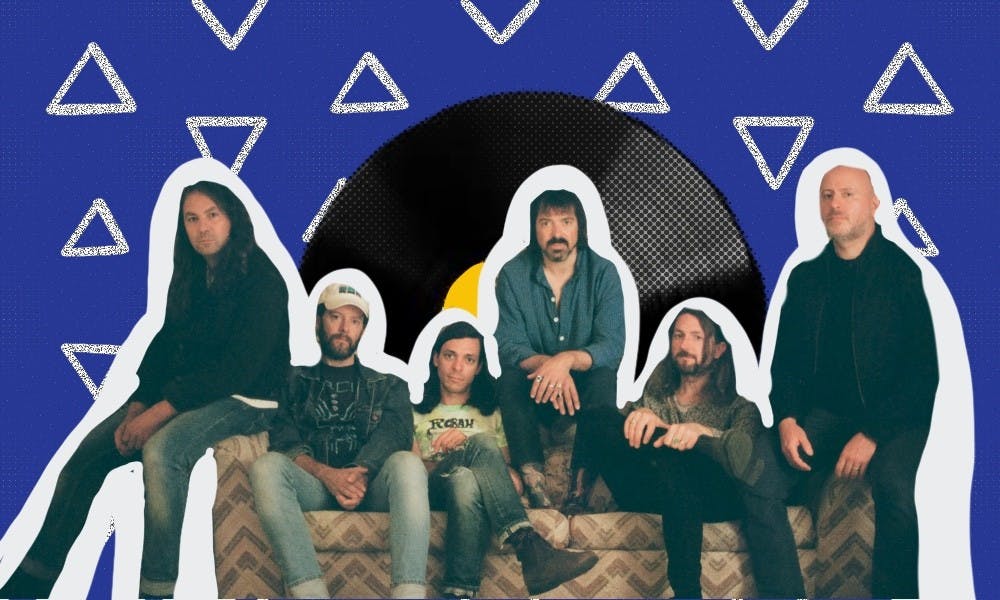Most artists might not be compelled to change their approach to music right after earning a Grammy. Adam Granduciel, the frontman of the band The War on Drugs, didn’t follow this notion—opting to depart sonically from the band’s last project, the award–winning A Deeper Understanding. Instead of moving their style forward into new territory, however, he decided to scale it back, shedding modern and neo–psychedelic elements and further embracing the sounds of heartland rock. While the aged genre has always been on the periphery of the group’s direction, it comes into clear view on I Don’t Live Here Anymore. The result is an album that, despite its cold and snowy cover, is warm and uplifting.
Granduciel makes his influences clear right at the album's outset. His vocals channel Bob Dylan over somber pianos and guitars in the opening track “Living Proof,” while the peppy single “Change” sees him veer closer to Tom Petty or Bruce Springsteen. The nocturnal “I Don’t Wanna Wait” calls back to Phil Collins' “In the Air Tonight.” New–wave music seeps through the synths and drum beats all throughout the album. While a bit derivative at times, the sound is a stunning recreation of the rock music that blasted in the radios of old Thunderbirds and pickup trucks in the ‘70s and ‘80s— a fantastic exercise in nostalgia.
Granduciel’s writing, while perfectly encapsulating the album’s universe, is full of folksy clichés. He portrays the stone–faced nomad telling his lover a story of his days trudging through unrecognizable lands with only his instruments. “I went down to the corner / They're building at my block / Maybe I've been gone too long / I can’t go back,” he laments on the opener, setting the lyrical tone for the rest of the album. He’s in a constant state of motion from song to song, each one a destination that he inhabits for only minutes before moving on again.
The idea of change permeates Granduciel’s musings. In a world that is altering more and more, he feels the need to change, too, which leads him to pick up his stuff and move. All the while, he admits that he doesn’t want to leave, only doing so because he saw it as necessary. He yearns for a past romance on “Harmonia’s Dream” and “I Don’t Wanna Wait,” but by the time he finally returns, the change wasn’t enough (or was too much) for the two of them to bear. “Victim” recalls the two falling apart, neither seeming to care when they need to. Eventually, with an electric guitar blaring underneath his voice, he has nothing left to wail but “Who are you?” He’s back to his old ways, which he further cements on the title track.
The song is a dramatic acceptance of his mission, to keep moving forward in search for the change that he needs. “We’re all just walkin’ through this darkness on our own,” he concludes in the chorus; indie pop band Lucius, the only collaborators on the album, echo that line over and over as the track fades away.
A couple of emotional ballads, separated by the misplaced and energetic tune “Wasted,” provide the record with vulnerable moments. “Old Skin” sees Granduciel soaring over a droning organ about the fear of returning to the old life, where he saw his dreams and family “fade away”; he fears the loss of love or hope, so he constantly moves to avoid attachment.
He follows this sentiment on the nature–focused “Rings Around My Father’s Eyes,” a tribute to his father. In the storms of his life, his father was a sunrise over the sea; without him, turbulence only threw his life into further turmoil. Granduciel, while writing the song, began to find a new meaning in it when he became a father. “As time went on with this record, I became a dad, and I started seeing it from the other side. It’s not so much a reflection on my relationship with my own dad, but starting to think about being a dad, being a protector,” he said to Apple Music.
The band wraps the album’s themes up with the closer, “Occasional Rain.” He returns to his past home, embracing the turmoil that might come with staying in place. “Oh, if loving you is the same / It’s only some occasional rain.” He’s at peace with the changes he may need to make at home, because the love that he experiences there outweighs it.
The band smartly uses the nostalgic sounds of the past to encourage a return to home. You might be able to drive away from any storm that rolls in, but the love of family and friends can always help you weather it, no matter how much it rains.







